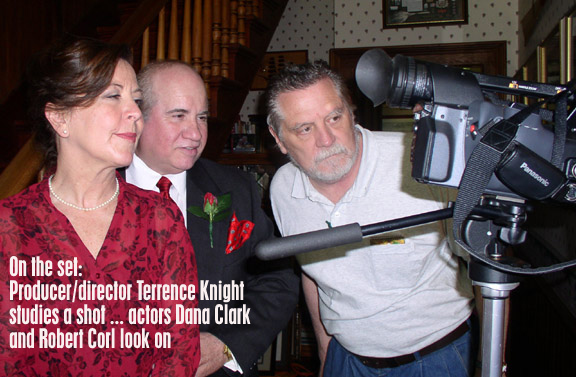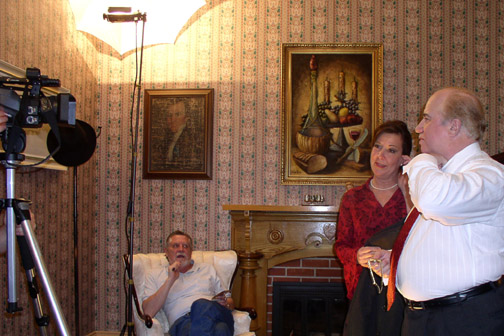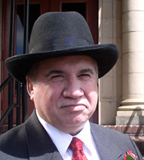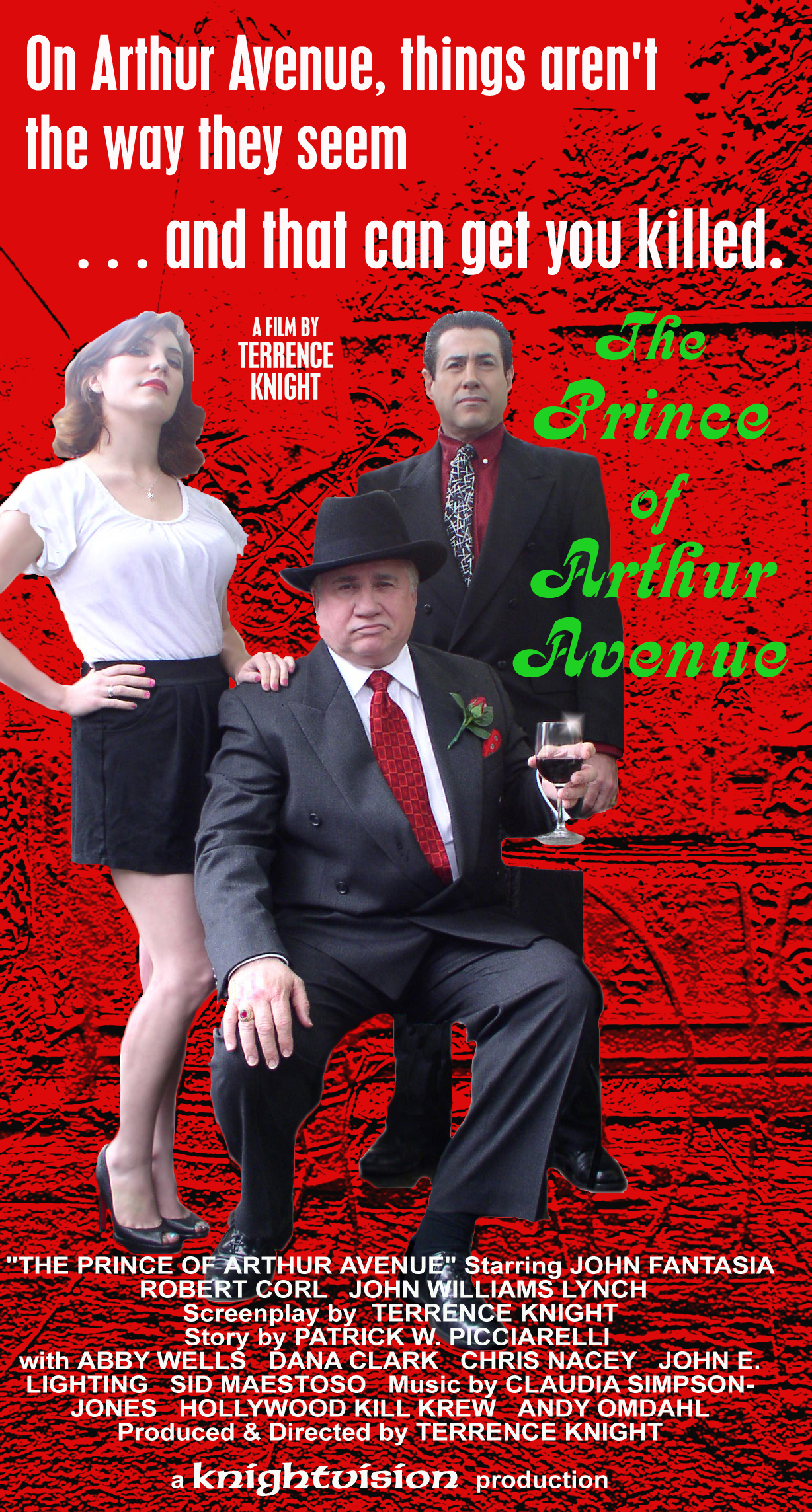INTERVIEW WITH THE PRODUCER/DIRECTOR
Terrence Knight is an award-winning print and broadcast journalist by way of Oklahoma to Chicago
to Montana and Olympia, Washington, where he published The Sitting Duck, an arts and
culture tabloid.
INT. Where did you find the story for "The Prince of Arthur Avenue?"
TK. The story was actually discovered by my mate, Jessica (Dillon). It's part of a collection of
mystery stories in a volume titled, "Bronx Noir". There was a series of noir titles out at the
time by Akashic Books in New York, and I had gotten into the habit of reading them in bed.
One night Jessica said to me, "You've got to read this one." So, I did. And immediately
I recognized that it was a story with huge filmic potential.
INT. What is it that makes the story particularly "filmic"?
TK. For one thing, it's largely about fantasy, about what is real and what is false, which is
something I had been thinking a lot about lately. And I got to thinking, isn't that what
movies are really about? Because all movies are ultimately fantasies, they're more like dreams
than reality, including films that purport to be "neo-realistic". And also, I thought it
would be cinematically challenging to make a movie that illustrates the thin line between
delusion and reality. In that way, "Prince" tricks the audience a little - but all movies
are "tricks". The moment I had finished reading it, I could "see" it in my mind.
I knew what it should look like.
 INT. Did the final product end up that way?
INT. Did the final product end up that way?
TK. There were so many bumps along the way that inevitably the vision got skewed here and
there.
But that can be a good thing. A lot of really talented people gave their advice, and in the
end, I think we ended up with something that is better than my original concept.
INT. You're best known as a polemicist. Does "Prince" have a political message that
reflects your philosophy?
TK. (laughs) Not enough to talk about. But at the time I read the story, I was thinking a lot
about how people
sometimes become convinced that such and such is true, and then, even when they discover they're
wrong, hold on to that belief. I find that to be a really curious part of human nature.
But more than anything, I just wanted "Prince" to be entertaining.
INT. What kind of artistic transition did you have to make as a writer of non-fiction to put
together a screenplay?
TK. That's a good question. I had never written a screenplay before and wasn't sure I could do
it. But I had the advantage of Picciarelli's story, which is so damn good, and he helped out.
Even so, I had several false starts before I was actually able to hammer it out.
INT. How long did it take you to finish the script?
TK. Once I got the hang of it, only a few weeks, although the first draft went through a lot of
revisions before we actually began shooting.
INT. What do you mean by "getting the hang of it?"
TK. I had a hard time at first. Then one night I was hovering over the keyboard, and
took a sip of Scotch, and it occurred to me that I was going about it all wrong. When
you write essays, what's important is to come up with new ideas and express them in a
way that is both lucid and compelling. But that's the wrong algorithm for a screenplay.
After all, I already had a great story - my job was to simply tell it visually. So then, each
time I wrote a line, I would ask myself, "what happens next?" Once I understood that, it
went along pretty fast.
INT. You have a background in producing short videos, but this is your first movie. What particular challenges did that pose for you?
TK. Funny thing, I was confident from the first that I could do it. Do you know what I mean? Did you ever see something wonderful or maybe hear a great song and think to yourself, "Hey, I bet I could do that."
INT. Sounds like you had a lot of confidence in yourself.
TK. You need to have a certain amount of hubris if you want to do something as crazy as making movies - or accomplish anything in life. Claudia Simpson-Jones, our musical supervisor, tells this wonderful story about how she decided to become a commercial airline pilot; she's one of the first women to ever fly the big jets. Someone showed her the cockpit of a big airliner, and the first thing she thought was, "Hey, I can do that! Toss me the keys!" If you sincerely believe that you have the natural talent to do something, then chances are pretty good you're right.
INT. What made you suddenly decide to make movies?
TK. I've always wanted to make motion pictures. There's just something about the movie experience
that you don't get in any other medium; there's a kind of "texture" to film, a hyper-reality, you
might call it. A really great movie can change your life. When I was a boy, my daddy took me to
see "High Noon", and I was enchanted by the camera work. That picture was a real groundbreaker.
Even back then, I wanted to make movies. But it was never really practical for me, and along
the way I got involved in journalism and television and other things. But the digital world
opened up all kinds of possibilities. Then I happened to meet Marc Turtletaub, the producer
of "Little Miss Sunshine", at a West Coast film festival. That's a wonderful little picture
that started with some folks with limited experience, but they had a great story. I already
had experience as a writer and in production, so somewhere between the champagne and the
salmon pate, it occurred to me that if they could do it, so could I.
INT. Did you get help and advice from other people?
TK. We were very lucky when it came to that. The novelist Jim Lynch reviewed the screenplay; and
playwright Bryan Willis did the casting and gave us lots of production advice. I also happened to
meet Piper Laurie, whom I regard as one of the greatest cinema actresses of all time. We talked a
lot about movies, especially about indie films and the importance of mastering the fundamentals.
She helped me think more about the acting profession, too.
INT. What do you mean?
TK. Well, I had been thinking for a long time about what makes a good performance. I can easily
criticize a picture on purely technical grounds - is the focus good, how's the lighting, what's the
design palette, things like that … but I realized I didn't really understand what acting is all
about. Why do some performances seem to really leap off the screen?
INT. And what did you discover?
TK. I realized that acting requires a high intelligence. On the one hand, if an actor basically
understands the role, all he or she has to do is show up and say the lines and then go home at the
end of the day. It's no more complicated than that. But to have a really great performance requires
something more. And I came to understand that what is most important is that the actor understand
the character on a profound level, with all the nuance of passion and conflict, the kind of really
gritty things that condition the human experience. That requires a deep understanding of people,
including people who may be quite different from you.
INT. How did you get your cast and crew together?
TK. I hooked up with some local talent, but most of it came from Seattle. We had a casting call,
and I called around and interviewed people. Making movies is very hard work, and it's very
important that you have people who not only have talent and skills, but a good professional
attitude and can work together.
INT. Was it hard to find people?
TK. Sometimes. But everyone loves movies, and lots of folks offered to help out in different
ways, like making their restaurant available for a location shoot, or agreeing to play a bit part.
For example, there's this little scene where Cynthia Salazar, who owns a flower shop in downtown
Olympia, meets Frank Bernardo on the street; he kisses her hand, and she turns and kind
of flutters her breast with her hand . . . it's a tiny gesture by a non-professional extra that
isn't even in the script, but it was a delightful little spontaneous gesture that adds a lot of
charm to the picture.
INT. Did you have a lot of surprises like that during filming?
TK. (laughs) I'll say. More than I can remember. You start out with a story and a script and then you do all this pre-production planning, which is a huge job, and then you get on the set and you have to make a lot of stuff up on the fly. The most important thing about producing, I would say, is learning to be resourceful.
INT. Is that the most important thing you learned?
TK. No, the most important thing is to be persistent. Although, come to think of it, I already knew that.
 JOHN FANTASIA has studied with
Lee Strasberg at the Actors Studio, and with Uta Hagen at the Carol
Rosenfeld American Academy of Dramatic Arts in New York. Credits include a wide variety of roles
in "The Right to Bear Arms", "Battle in Seattle" (Insight), "The Coffee Break" (VVrus Films),
"The King of New York", "Highlander" (I & II), and many more; television work includes a performance
as Detective Matt Haney Wall for the Discovery Channel (Wall to Wall), "The Sekai Gyoten News"
(Nippon Television, Tokyo), and multiple appearances in "NYPD Blue" (NBC), "Law & Order" (ABC),
and "The Cosby Show".
JOHN FANTASIA has studied with
Lee Strasberg at the Actors Studio, and with Uta Hagen at the Carol
Rosenfeld American Academy of Dramatic Arts in New York. Credits include a wide variety of roles
in "The Right to Bear Arms", "Battle in Seattle" (Insight), "The Coffee Break" (VVrus Films),
"The King of New York", "Highlander" (I & II), and many more; television work includes a performance
as Detective Matt Haney Wall for the Discovery Channel (Wall to Wall), "The Sekai Gyoten News"
(Nippon Television, Tokyo), and multiple appearances in "NYPD Blue" (NBC), "Law & Order" (ABC),
and "The Cosby Show".
 The part of aging mobster Frank Bernardo is the first dramatic narrative role for
The part of aging mobster Frank Bernardo is the first dramatic narrative role for  Seattle actor JOHN WILLIAMS LYNCH began his career in
musicals,
Seattle actor JOHN WILLIAMS LYNCH began his career in
musicals,
 during a recent performance, and
trumpeter ANDY OMDAHL, a much respected studio musician who has
recorded for feature films.
during a recent performance, and
trumpeter ANDY OMDAHL, a much respected studio musician who has
recorded for feature films.
 INT. Did the final product end up that way?
INT. Did the final product end up that way?

 "The Prince of Arthur Avenue is a clever and provocative twist on the modern mob story. And Terrence Knight appears to be a natural filmmaker, pushing the envelope with this short flick as his daring debut."–Jim Lynch, author 'Border Songs', 'The Highest Tide'
"The Prince of Arthur Avenue is a clever and provocative twist on the modern mob story. And Terrence Knight appears to be a natural filmmaker, pushing the envelope with this short flick as his daring debut."–Jim Lynch, author 'Border Songs', 'The Highest Tide'![]()
 The PRINCE of
The PRINCE of